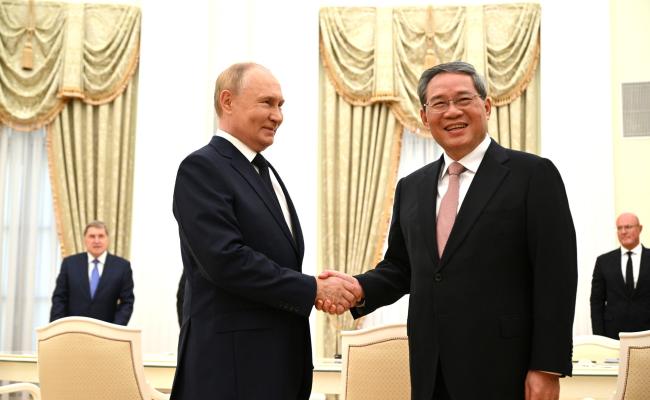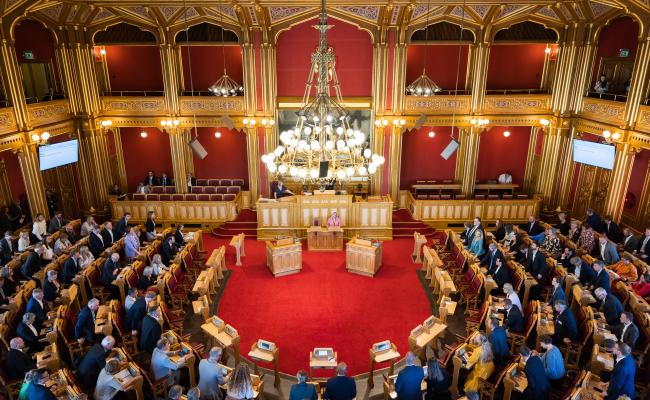Climate Change as a Threat Multiplier: “Directly Impacts Norwegian Security”

Marius Nyquist Pedersen (left) and Bjørn Olav Knutsen at the Norwegian Defence Research Institute have conducted research on the role of climate change in the security situation in the North. (Photo: Lars Aarønæs, FFI)
Researchers at the Norwegian Defense Research Establishment (FFI) have researched how climate change can function as a threat multiplier for security in the Arctic. They emphasize that uncertainty is the biggest security threat and that they cannot observe any major changes in the security situation in the north so far.
Bjørn Olav Knutsen (FFI and Nord University) and Marius Nyquist Pedersen (FF) have explored how climate change can reinforce security dilemmas in the Arctic in their research article "How to Understand Climate Change as a Threat Multiplier in the Arctic".
The study is part of the FFI project Climate and Security and is based on interviews with primary sources.
"Climate change can lead to new actors accessing the region, and in a situation with increased geopolitical competition, one can envision climate change to be a sort of threat multiplier," says Bjørn Olav Knutsen in an interview with High North News.
Has everything to do with perception
Security dilemma
A security dilemma occurs when states introduce measures to increase their own security and thereby incite reactions from other states. This could potentially lead to reduced security for all involved, as one state's increased security could be perceived as a threat to the security of another.
"This has to do with how actors perceive each other. It has nothing to do with capabilities but with perception. Measures that one state implements to strengthen its own security can be perceived as threatening to others, and the other state will then introduce its own countermeasures. The result could be reduced security for all," explains Knutsen.
The researchers believe that climate change could exacerbate such dilemmas. Their research particularly focuses on the Barents region, where climate change can weaken natural barriers, such as ice sheets, and thus make the area more accessible for offensive strategies, particularly in the maritime sector.
The Barents Region
The Barents Region comprises thirteen countries or similar regional units in Norway, Russia, Finland, and Sweden.
The region is the geographic area covered by the cooperation agreement from January 11th, 1993 (the Kirkenes Declaration). This agreement established the Barents Euro-Arctic Council.
The council is a regional cooperation organisation between the governments of Denmark, Finland, Iceland, Norway, Sweden, and until 2023, Russia.
Finland recently reported that it would withdraw from the council after 2025.
Yet, climate change has not had any major influence on the security situation in the north so far.
"It was evident in our interviews. The Norwegian actors that operate daily in the north do not see any major changes regarding climate change," says Knutsen.
"They see some changes, such as more activity. New countries are showing interest, more fishing, more sailing. Politically, there is also more interest in the Arctic than before. But they do not feel that there is any major security threat due to climate change at the moment," Marius Nyquist Pedersen adds.
The researchers underline that the Arctic is still a cold and inhospitable region and that this situation will last.
"But there is increased access and an evident militarization of the Arctic. However, we point out in the article that geographically close threats feel more severe. When the Arctic is militarized, it includes more attention at a political and military level. There is more activity in the Arctic, and new states want access. These components contribute to creating more uncertainty," says Pedersen and adds:
"The security threat is the uncertainty."
He says that we are not used to the Arctic being a full-blown geopolitical region after a long period of Arctic exceptionalism or the idea that the Arctic is a region for cooperation and low conflict. The researchers have, therefore, taken a sober and fact-based approach and do not wish to speculate on which specific security challenges may or may not arise due to climate change in the future. Instead, they want to look at what issues we are facing today.
The Armed Forces' long-term plan
In June this year, the Norwegian parliament unanimously adopted a new long-term plan for the defense sector. The plan emphasizes that one of the main challenges for Norwegian security is the increased risk of being marginalized, i.e., that Norwegian interests and security are not being considered.
"The long-term plan showcases how we must avoid the risk of Norwegian marginalization due to increased geopolitical competition in the High North," says Knutsen and continues:
"It is a vital national interest. In other words, climate change directly impacts Norwegian national security."
He says the plan underlines climate change as an increasingly independent security challenge for Norway.
No militarization of climate change
In 2021, NATO adopted the Climate Change and Security Action Plan, with the aim of becoming the leading international organization in understanding and adapting to climate change's impact on security.
The researchers emphasize that NATO's acknowledgment of climate change as a security challenge will not lead to greater militarization of the Arctic.
"NATO showing interest in climate change like this will not necessarily entail militarization of climate change," says Knutsen.
"Climate change will, for example, impact how NATO conducts operations, challenges we face in the alliance, and so forth. It is completely natural for NATO to be involved when it comes to climate change, and there is a general increased awareness of the issue."
"However, climate change does not necessarily entail militarization just because those challenges impact NATO and Norwegian security and defense policy."
Climate change does not necessarily entail militarization
Military exercises
Arctic military exercises have been impacted by climate change, says the FFI researchers.
"From the political side, there has been great militarization over the past ten years, particularly on the Russian side. That also leads the allied countries to practice their activity in the north to a higher degree, but climate change also contributes to creating that interest," says Pedersen.
He explains that more navigable sea for greater parts of the year and more interest and activity in the Arctic are changing the conditions for all military and civilian activity.
"So military exercises must also adapt. Perhaps we must practice more in new areas. An important aspect we heard in our interviews is that melting snow and ice take land mass into the ocean, making navigation challenging for maritime forces. Many sea areas that have been under ice are either poorly or not mapped. It is a challenge and showcases the need to train more and in new areas."
China as a 'near-Arctic state'
What role can non-Arctic actors and states such as China play in the security situation in the Barents region as climate change brings new opportunities regarding resources and shipping?
"China has defined itself as a 'near-Arctic state,' which can sound suspicious to Arctic states. But they have not conducted any military activity in the Arctic," answers Pedersen.
However, they are conducting a lot of research. Some researchers believe that China's research activity in the Arctic functions as its entry point into the region. Others think the Arctic is not a priority for China.
"Russia has its most important strategic capabilities in the Arctic and does not want more modern Western and Chinese forces to have some form of confrontation in the Arctic, so close. That part of Arctic policy continues. It is in all actors' interest, either directly Arctic states or near-Arctic states, to keep the situation peaceful," says Pedersen and adds:
"We must be careful not to be too up in arms in the analysis of China in the Arctic, although we must not be naive either."




